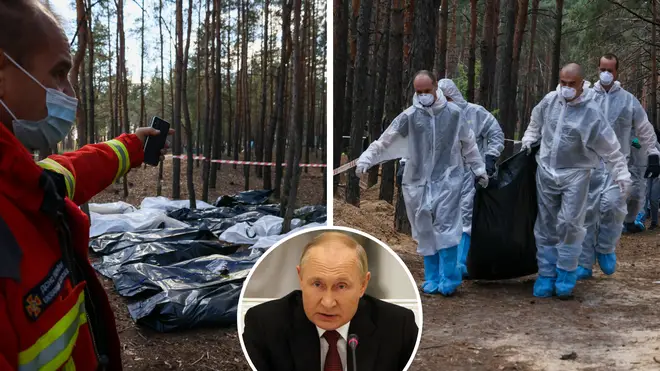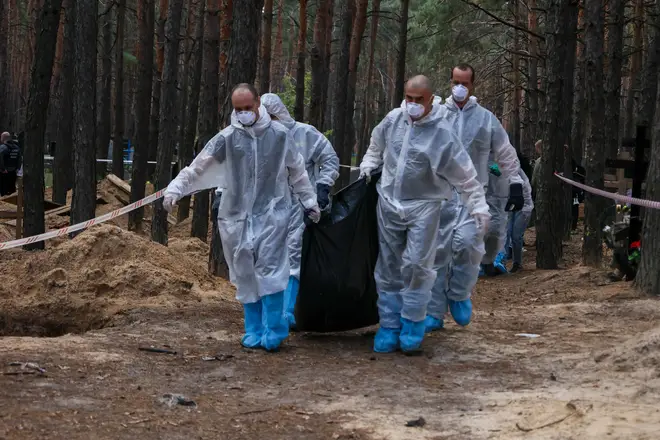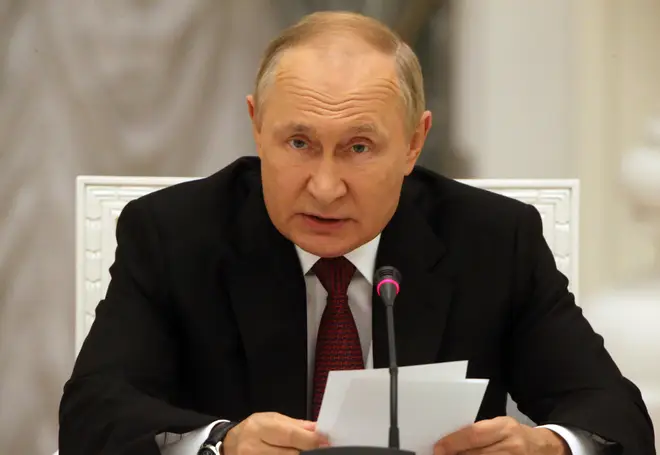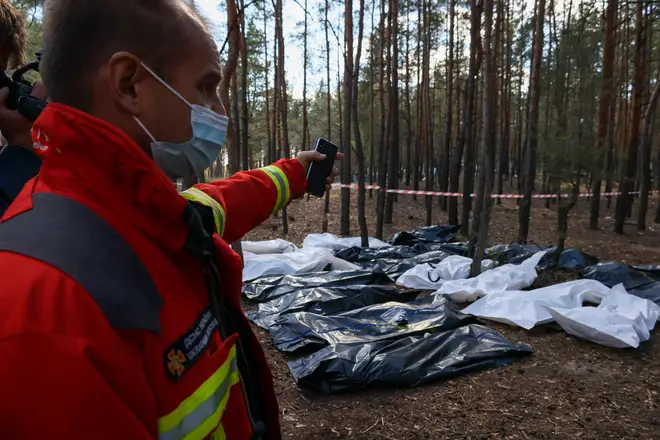
James O'Brien 10am - 1pm
20 September 2022, 14:55 | Updated: 21 September 2022, 10:17

Russia appears to be paving the way for full mobilisation of its troops after passing new laws to punish soldiers that break ranks during "mobilisation, martial law [or] wartime".
Ukrainian President Volodymyr Zelenskyy said on Monday that the new rules showed the Kremlin was "clearly in a panic".
The amendments to Russia's Criminal Code, approved by the Kremlin-controlled lower house of parliament, introduces severe punishments for failure to follow orders, desertion or surrendering to the enemy.
Meanwhile puppet governments in the Russian-occupied Luhansk, Donetsk, Zaporizhzhia and Kherson regions of Ukraine have begun preparations to hold sham referendums on becoming part of mainland Russia, in the face of gains from Ukraine.
Read more: Russia may be unable to fend off another Ukraine attack experts say as Putin vows to press on
Read more: Kate meets Ukraine's first lady after President Zelensky's wife Olena pays tribute to the Queen
President Zelenskyy said the moved show the Kremlin was panicking about its progress.
"The occupiers are clearly in a panic," he said on Monday night.

Putin warns West as he announces partial mobilisation for Russian citizens
The new laws now need to receive the upper house's approval and then be signed by Putin to become law - steps that are considered to be mere formalities.
Under the new legislation, deserting a military unit during a period of mobilisation or martial law would be punishable by up to 10 years in prison, compared with five years under the current law.
Soldiers who voluntarily surrender to the enemy will also face a prison term of up to 10 years, and those convicted of looting could be handed 15 years.
Another amendment introduces a prison sentence of up to 10 years for those who refuse to go to combat or follow an officer's order.
Read more: Liz Truss pledges £2.3bn in military aid for Ukraine as politics returns
Read more: Russian nationalists call for Putin to step up war efforts after stunning Ukraine advances
The new legislation follows media reports that some Russian soldiers in Ukraine have refused to go into combat and tried to resign from service.
Unlike Ukraine, which conducted a broad mobilisation with the goal of reaching an active military of a million fighters, Russia has continued to rely on a limited contingent of volunteers.


Chair of War Studies Anthony King discusses the future of war in Ukraine
Some nationalist politicians have called for a mobilisation to beef up the ranks, but the Kremlin so far has ruled it out.
But the use of the specific wording in the new rules suggests Putin could be laying the groundwork to escalate the conflict.
What's more, if he could claim the Russian-occupied parts of Ukraine are actually Russian owned - which he might if the referendums pass - he could claim attacks on those regions are on Russian soil, which could be a pretext under which to move away from calling the conflict in Ukraine a "special military operation" and towards a full-blown war.

Ukraine has been gradually reclaiming some territory from Russia over recent weeks.
In the once-occupied city of Izium, hundreds of graves were found with the bodies showing "signs of violent death" - including having their genitalia severed.
Yevhenii Yenin, a deputy minister in Ukraine's Internal Affairs Ministry, told a national telecast: "There are many of them... these are broken ribs and broken heads, men with bound hands, broken jaws and severed genitalia."

Ukrainian officials have also accused Russian forces of torturing people in occupied areas, including shocking them with radio telephones dating back to the Soviet era.
Russia has repeatedly denied abusing or killing prisoners, though Ukrainian officials found mass graves around the city of Bucha after blunting a Russian offensive targeting Kyiv at the start of the war.
Read more: Russian troops 'surrendering en masse' as Ukraine recaptures over 6,000 sq km of land
Read more: Russian troops retreat as Ukraine takes back key towns in Kharkiv offensive
Meanwhile, a Ukrainian push continues in the south of the country.
The Washington-based institute, citing the Ukrainian military, said Kyiv has destroyed ammunition depots, two command posts and an electronic warfare system.
Ukraine's southern military command said early on Tuesday its troops sank a Russian barge carrying troops and weapons across the Dnipro River near the Russian-occupied city of Nova Kakhovka.
It offered no other details on the sinking of the barge in Ukraine's Russian-occupied Kherson region, which has been a major target as part of Kyiv's ongoing counter-offensive in the country.